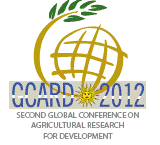What was said about GCARD2
[News]


Alexander Müller (FAO):
If we are talking about innovation, we have to look how we can change the situation on the ground. So looking at impacts, the improvement in the livelihoods under very different circumstances is the most important issue, and therefore, I really think that the GCARD Conference is absolutely necessary because there is no place in the world where we can bring farmers and scientists together looking at institutional building, at knowledge sharing, at building platforms than at GCARD. This is a unique Conference. And here I can answer the Carlos’ question: are we spending too much money bringing 700 people to solve the problems of 5 hundred million small-holder farmers? – I think this is a well invested money.
Bruce Campbell (CCAFS):
At this type of event you meet people that you wouldn’t ordinarily meet, and they can give you really interesting insights into the kinds of things that are needed. And there are a lot of users here, as opposed to researchers, and therefore you start thinking about the kinds of products that we need to deliver as scientists. We essentially want to make our research demand-driven.
Carlos Pérez del Castillo (CGIAR Consortium):
It has been a very useful experience. We have learned a number of lessons, we have listened very carefully, and we are ready to adjust a number of things. Some of the lessons that we have drown are important for our work. There are other lessons that we drew from this meeting that will need to be incorporated in any future meeting.
Sujiro Seam (Ministry of Foreign Affairs, France):
Partnership is not only between the public institutions; partnership is really for farmers, for private sector, because most of the investments will come from the private sector. Partnership is also for the most vulnerable people, who do not have a voice usually, except in events like GCARD. It is a pleasure for me to be here, because I feel that what GCARD is all about is really about partnership; partnership to deliver on AR4D, to deliver on poverty alleviation and to deliver on food security. It is a unique place where ALL stakeholders can meet together to address the challenges for development.
Stephen Hall (WorldFish):
We need to think with the farmers rather than to think for them. Our role as a technical provider becomes very low, but as a facilitator or a broker of bringing the right technologies in may become increasingly important. And learning how to do that well and develop the culture for doing that well, I think, is a really important part of events like GCARD. This should also help us getting the message out that, that is the way we want to work and the way we want to be, and attracting the partnerships that will come from having this modus operandi.
Emily Hillenbrand (Helen Keller International, Cambodia):
For Helen Keller International, GCARD2 was an opportunity to share some of our practical lessons learned and approaches to integrating nutrition, agriculture, and health and to draw attention to the importance of behavior change, communication and addressing gender in nutrition strategies—whatever the vehicle or intervention may be. As the same time, it was an opportunity for us to better understand the priorities and interests of those in the agriculture and ag-research community, and to strengthen partnerships, particularly for building the evidence base for successful agriculture-based nutrition interventions. We expect that GCARD3 will showcase more of that evidence. Again, thanks to GFAR for organizing this important panel and supporting concerted multi-sectorial actions.
William Dar (ICRISAT):
GCARD2 was invigorating. But it made clear that much hard work lies ahead. GFAR Chair Dr. Monty Jones urged us to unite around the six-point plan of the GCARD Road Map: inclusive priority-setting, equal partnerships, increased investment, improved capacities, improved development impacts, and better communication of achievements. It was agreed that we all share responsibility and accountability for executing towards those targets. We embrace that challenge, because we believe that GCARD has got it right. Inclusive and innovative partnerships, guided by well-informed foresight, will illuminate the road ahead. Let’s strengthen our partnerships to accelerate the engine of development for smallholders.
Robert Carlson (World Farmers’ Organisation):
I would like to express to you my highest satisfaction and gratitude for having invited WFO to the GCARD 2012. The level of discussions and results achieved over the entire event were remarkable. I am also particularly glad to notice that GCARD's conclusive remarks focused on farmers, women, youth and extension as main partners to work with for the future challenges and activities of GCARD.
Vicki Wilde (AWARD)
My hearty congratulations on GCARD 2. Most of the side sessions that I was able to attend were meaty and meaningful, with an excellent cast of speakers. Of particular importance to me was your strong and persistent message of Change. I thank you wholeheartedly for positioning the issues of youth, women, nutrition, and sustainability into the very heart of GCARD. I hope that you and your team are celebrating a job well done.
Frank Rijsberman (CGIAR Consortium)
Feeding the world without wrecking the planet is still the greatest challenge facing humanity in coming decades, and we want to use GCARD2 to make sure that agricultural research and development are ready to take on that challenge.
Gine Zwaart (Oxfam Novib)
Thank you once again for giving me the opportunity to be at the GCARD conference. I really enjoyed it, learned at lot, established many new contacts and was pleased to be given the opportunity to address some of the points important for us at Oxfam. I will surely be in touch about the work of the Oxfam Future of Agriculture research project with the Global Foresight Hub. Thanks again and I hope you are able to look back to a successful conference.
Posted on 21/11/2012

